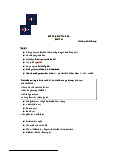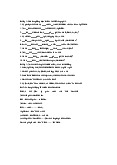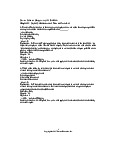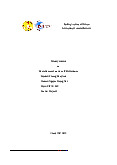


Preview text:
Q2e Reading and Writing 3 Unit 5 Test A
Name: ______________________________________ Date: _____________ Reading and Writing Looking for Excitement Section I
Can you remember how you felt the first time you asked someone out on a date? Was your heart pounding, were
your hands a little shaky, were you in a sweat? Did you go through with it? The signs – or is it symptoms? – of fear
and excitement are very similar: the adrenaline rush, the body’s response to a perceived situation of stress or
danger. It’s a physiological thing, a chemical thing. It would seem we have little say in the matter. Section II
Asking someone on a date you are not risking life and limb, but if you mess it up you may well feel that the
psychological risk – rejection and all the feelings that go with it – outweighs the possible benefits of getting to
know that person. But you did go through with it, and did it again on many other occasions with other people
without, one hopes, losing that tingle of fear or excitement. In fact, without it there wouldn’t be much point, no
“rush”. You learn, I think, to trick your mind into believing that what might be fear is in fact excitement. Whether
or not this is so, there is always a pleasurable sense of daring when you step outside what is called your “comfort zone”. Section III
Occasions to do this present themselves every day and in ordinary circumstances. You don’t have to go in for
extreme sports. You might decide to take on a job with extra responsibilities, so that the buck stops with you, or
give a speech for the first time, or tell your boss what you really think of her. Doing things such as these is largely
beneficial but, as always, there’s another side to it. Many of us take risks that we should know in advance can have
serious negative consequences, if not immediately then in the long term. Section IV
The effects may be seen over some time because these risks often become addictions. Smoking, drinking,
gambling, and overeating spring to mind, but also less seemingly harmful pastimes, like collecting, when they
become obsessions. There’s no excuse for not knowing what harm smoking can do, yet dedicated smokers have
somehow convinced themselves that they’re immune. Gamblers have a different mind-set, more like extreme
sports junkies: imagine betting your house on the turn of a card – imagine the “rush”! Quite possibly losing is as big a kick as winning for them. Section V
We all have some kind of obsession or addiction, however minor, which in the past would have been called a
“weakness for” something, but which these days is called a problem, or even a disease. The suffix –aholic can be
attached to almost anything: we have chocoholics, shopaholics, and so on. The media and lifestyle magazines play
this up and what we thought of as a harmless personality trait becomes something we should feel guilty about.
Guilt, too, has an edge to it. Section VI
The adrenaline rush response was originally used to describe our reaction to sudden, surprising situations – you
are suddenly confronted by a lion in the wild, for example – but now we go looking for it. This should mean that we
have thought a bit about the consequences. Unfortunately, many don’t think far enough ahead and find
themselves hooked, and what once provided kicks becomes routine.
© Oxford University Press. Permission to edit and reproduce for instructional use. 1
Q2e Reading and Writing 3 Unit 5 Test A
Name: ______________________________________ Date: _____________ Choose the best answer.
1. In Section I, the writers implies that
A. we are always frightened on our first date.
B. sweating is normal when you first ask somebody out.
C. we have little control over our physical reactions.
D. dating is simply a matter of chemistry.
2. Which verb is closest in meaning to “mess it up”? A. fail B. reject C. fear D. avoid 3. i
What does “Occasions to do this” n Section III refer to?
A. tricking your mind into thinking fear is excitement
B. taking on a job with extra responsibilities
C. stepping out of your comfort zone
D. doing things that are generally beneficial
4. The writer suggests that under normal circumstances
A. we deliberately take harmful risks.
B. some risk-taking will do us good.
C. we’re certain which risks are harmful.
D. we run away from responsibilities.
5. In Section IV the writer suggests that
A. addiction to gambling and addiction to extreme sports are similar.
B. people should avoid hobbies like collecting things.
C. gambling and overeating always become addictions.
D. smokers are certain that their addiction is safe.
© Oxford University Press. Permission to edit and reproduce for instructional use. 2
Q2e Reading and Writing 3 Unit 5 Test A
Name: ______________________________________ Date: _____________
Complete the sentence. Choose A, B, or C.
6. For risk takers who like physical activity, mountain climbing is the _____ challenge. A. trivial B. unfortunate C. ultimate
7. The skier was _____ to compete in next year’s Olympic Games. A. determined B. embarrassed C. implied
8. Melinda _____ stepped off the bridge and took her first bungee jump. A. extremely B. bravely C. cheerfully
9. The climbing teacher’s _____ was to make sure that everyone reached the mountain top safely. A. risk B. role C. route
Complete the paragraph with the correct form of the verbs in parentheses. Use the simple
past, past perfect, or simple present. ate is made went started got
Rock climbing (10) ____________________ is
(be) a fun, but dangerous, sport.
When I (11) ____________________ went
(go) rock climbing last year, I felt a little nervous. My friends and I ( 2) 1 ____________________ had got
(get) to the site early in the morning. I ( 3)
1 ____________________ (eat) ate
a good breakfast, but my stomach was
still full of nerves. Finally, I (14) ____________________ started (start) to climb.
With my friends’ help, I (15) ____________________ made (make) it to the top.
© Oxford University Press. Permission to edit and reproduce for instructional use. 3




